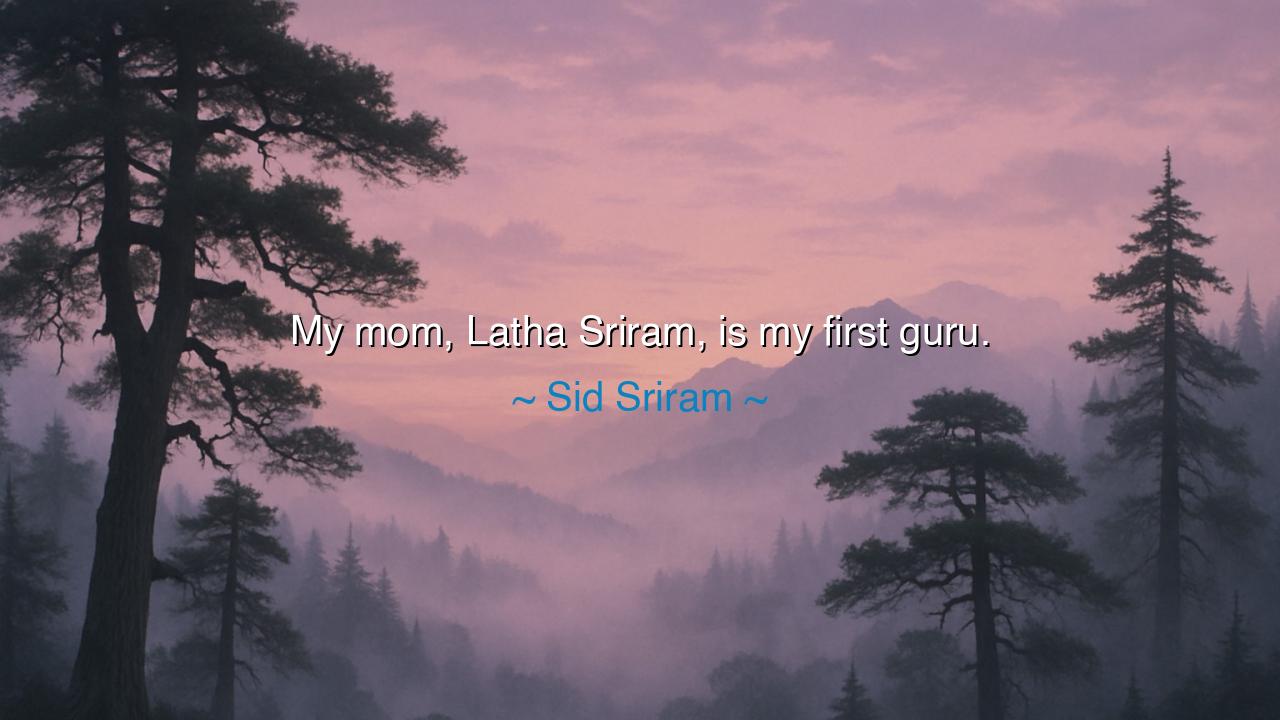
My mom, Latha Sriram, is my first guru.






“My mom, Latha Sriram, is my first guru.” — Sid Sriram
In this simple yet profoundly sacred declaration, Sid Sriram pays homage not only to his mother but to the divine lineage of teachers that the ancients revered as the foundation of all wisdom. When he says, “My mom, Latha Sriram, is my first guru,” he is not merely acknowledging who taught him music — he is recognizing the source of his spirit, the one who awakened his soul to rhythm, discipline, and devotion. In the language of the ancients, a guru is not just an instructor; the word itself means “the one who dispels darkness.” To call one’s mother a guru, therefore, is to say that through her love and guidance, one was brought from ignorance into light — from silence into song.
The origin of this quote lies in both cultural reverence and personal truth. In the Indian tradition, the mother is the first teacher, the one who shapes a child’s mind before any temple, book, or master can. Through her voice, the world gains its first melody; through her example, the child learns the meaning of virtue. Sid Sriram, a musician whose art bridges the East and West, grew up under the guidance of his mother, Latha Sriram, a respected Carnatic music teacher in California. It was from her that he learned not only the structure of raga and rhythm but the deeper essence of bhakti — the devotion that transforms art into worship. His words thus stand as both gratitude and acknowledgment of the eternal truth: the roots of greatness are often planted by the quiet hands of a parent.
The ancients would have understood this bond between student and guru, mother and child, as sacred. In the Upanishads, it is said that one must revere the mother, for she is the first embodiment of the divine encountered by every soul. Matru devo bhava — “Let the mother be your god.” To honor one’s mother as a guru is to understand that teaching is an act of love, and that knowledge without compassion is hollow. The ancient sages believed that wisdom flows best when carried by affection — that the truth of the heart is greater than the truth of the mind. Thus, when Sid Sriram learned music from his mother, he did not merely learn a skill — he inherited a way of life, one built upon humility, reverence, and the sacred duty of carrying beauty into the world.
In calling his mother his first guru, Sid also acknowledges a universal truth about learning: that all mastery begins with foundation, and the foundation is often laid by those who love us most. Before he ever stood upon a stage or sang before thousands, his mother’s voice guided him in the smallness of home — correcting his notes, shaping his tone, and reminding him that art is not about fame, but about truth and devotion. The ancients would have said that the truest art comes not from ambition, but from gratitude. To bow before one’s teacher — especially one’s parent — is to remain grounded, no matter how high one rises.
There is a story from the life of Ekalavya, the devoted student from the Mahabharata. Though denied formal instruction by his desired teacher, Dronacharya, Ekalavya built a clay statue of the guru and trained before it with unwavering faith. His dedication made him a master archer, surpassing even the teacher’s own pupils. Like Ekalavya, Sid Sriram’s reverence for his mother — his first and truest guide — is a reminder that the spirit of a guru lives not in temples or schools but in the heart. When we approach learning with humility and love, every lesson becomes sacred, and every act becomes an offering.
His statement also carries the wisdom of continuity. For in every generation, the torch of knowledge must pass from one hand to the next. Just as Latha Sriram passed the art of music to her son, so too must each of us become both student and teacher in our own time — learning deeply and giving selflessly. The ancients said that knowledge unshared is like a lamp kept under a bowl — its light wasted. To honor one’s guru is to continue their work, to carry their flame into the world. In this way, Sid’s tribute to his mother is not only about gratitude but also about duty: the duty to preserve, evolve, and pass on what he has received.
Let this, then, be the lesson: remember your first guru, and walk through life with gratitude toward those who taught you the meaning of your craft, your character, and your soul. For the foundation of greatness is humility, and humility begins with remembrance. Honor your parents, your teachers, and your mentors, for they are the architects of your destiny. Teach what you have learned, not for recognition but for love — for the act of teaching is the act of keeping light alive.
As the ancients would say, “He who honors his teacher honors the divine itself.” Thus, when Sid Sriram calls his mother his first guru, he is not merely paying homage to one person — he is acknowledging the eternal truth that wisdom, art, and love all begin at home. For the hand that first steadies your voice, the voice that first teaches you to listen, and the heart that first shows you devotion — these are the greatest gifts a soul can ever receive. And to call one’s mother a guru is to say, “She gave me not only life, but light.”






AAdministratorAdministrator
Welcome, honored guests. Please leave a comment, we will respond soon